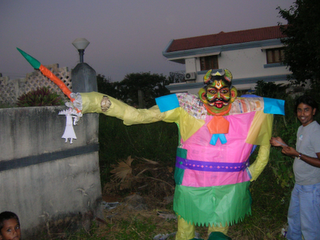Everything about Diwali can be found here:
http://en.wikipedia.org/wiki/Diwali
So, the big party is tomorrow Saturday 21st October, the most important day, but it also depends if you are Sikh, Jain or Hindu.

In Mumbai I also bought a book from Prahalad: "The Fortune at the Bottom of the Pyramid: Eradicating Poverty Through Profits (Paperback) "
http://www.amazon.com/Fortune-Bottom-Pyramid-Eradicating-Through/dp/0131877291/sr=1-1/qid=1161352620/ref=sr_1_1/102-3944424-3796911?ie=UTF8&s=books
It is a very interesting book to read I think, even though I only completed the first 10 pages. It analyzes business and innovation opportunities for very poor people that are at the bottom of the pyramid. Together, this layer is responsible probably for only 5% of the world economy, but it is a market of about 4 billion people and I read something like US$ 30 trillion, but that is to be confirmed.
Taking into account brand awareness as well and already some initiatives towards that market, it would be very interesting to see what can be done from an economic point of view to create market-entry opportunities for these people, rather than make them dependent on more charitable projects and initiatives of the government and world leadership.
One point is clear:"Do not assume that you understand the purchasing choices the poor make, nor assume that there is no market for certain luxury goods there". Example is the television set. Whereas the majority of these people hardly have money for primary needs, 95% of Brazil for example and 70% of Indian poor people have access to television (Brazil seems to have better coverage, which may explain the difference).
One of the problems in this regard is exactly access to the market. If there is a correct and focused economic stimulus for these people to produce and sell, and they work out their logistics problems, I believe there is a very good opportunity to improve the conditions of their lives. So, what is needed here is some focus and innovation in the supply chain mostly.
Problematic is the so-called "poverty penalty". This is an amount of money that goes on top of the actual rate or price due to lack of access to good transportation, too many men in the middle that all put their rates on top of the good, etc... This is the reason why a pack of rice is more expensive to poor people, they have to pay sometimes up to 600% of interest on their loans (against 7-28% for richer people). So there are lots of opportunities there. Even if you reduce this percentage from 600 -> 25%, you would have made an incredible reduction in the interest. Look back towards the number of people in this market, the money involved in this area and imagine this growing with your company brand name in the middle of this movement...
Fishermen here in India use a mobile phone to find the best landing point for selling their fish (they negotiate whilst at sea)... other examples include women in slums that get their hands on a mobile phone and sell the phone minutes for slightly more then they are charged (and considering the complexity of phone minutes, tariffs, discounts, etc... you surely cannot assume that these people are simple. You do need to be able to calculate quite well in order to make money out of those complex tariff schemes, or you lose it if you get it wrong).
There are some Brazilian projects in this area as well, but have not got to that section yet. Tomorrow we'll most likely be celebrating over the place, so not sure if I can post anything.
G>




No comments:
Post a Comment